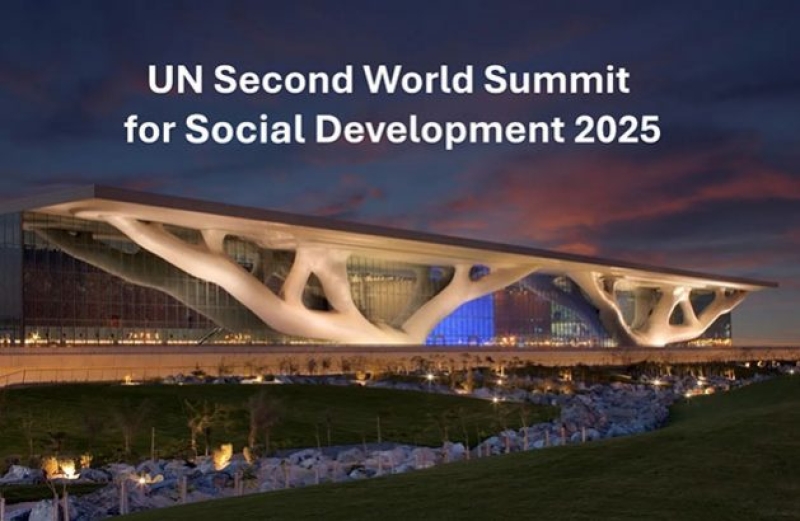- India Sees 9% Drop in Foreign Tourists as Bangladesh Visits Plunge |
- Dhaka Urges Restraint in Pakistan-Afghan War |
- Guterres Urges Action on Safe Migration Pact |
- OpenAI Raises $110B in Amazon-Led Funding |
- Puppet show enchants Children as Boi Mela comes alive on day 2 |
2025 Social Summit Risks Failure Without Bold Commitments

At the heart of the United Nations, quiet murmurs are growing louder: the much-anticipated Second World Summit for Social Development, set for 4–6 November 2025 in Doha, may fall far short of what the world needs. Despite being billed as a critical turning point for global social progress, early signs point to a lack of ambition—tempered by “summit fatigue” and a rise in regressive politics that threaten the spirit of multilateralism.
Following a crowded calendar of international gatherings—the 2023 SDG Summit, the 2024 Summit of the Future, and the 2025 Financing for Development Conference—many policymakers seem content with minimal outcomes. The Zero Draft of the Political Declaration for the summit reflects this low ambition, failing to match the scale and urgency of today’s global challenges. With multilateralism under pressure and the language of human rights increasingly under attack, some stakeholders are settling for the mere fact of reaching agreement, regardless of its impact.
But this is not the time to retreat into caution. Since the historic 1995 Copenhagen Social Summit, the world has entered a new era marked by overlapping crises: the aftershocks of a global pandemic, escalating living costs, democratic backsliding, corporate dominance over public welfare, the climate emergency, and looming mass unemployment driven by artificial intelligence. Inequalities—between and within countries—have reached grotesque proportions, social unrest is spreading, and faith in public institutions is dangerously thin.
Against this backdrop, the upcoming summit must become a rallying point for justice, equity, and renewed social commitment. What is at stake is not just a political declaration, but the future role of the United Nations as a beacon of dignity, fairness, and global solidarity.
To be meaningful, the 2025 Social Summit must go beyond lofty words. The declaration must embrace concrete, binding commitments that put people—not profits or growth—at the centre of policy. It must confront the uncomfortable realities of our time. That includes reversing decades of austerity and privatisation that have gutted public services and deepened exclusion, particularly for women, workers, and marginalised communities. It also means demanding fairer economic systems where progressive taxation, inclusive labour markets, and social protection are non-negotiable fundamentals.
Equally urgent is the need to address the rapid rise of artificial intelligence. While AI generates immense private wealth, it also threatens millions of jobs—especially those held by women in administrative roles. Without proper regulation and redistribution, this could deepen existing inequalities. Governments must step in to ensure adequate social safety nets, tax tech-driven profits, and invest in reskilling and decent employment opportunities.
Moreover, the summit must challenge the outdated obsession with GDP as the sole indicator of progress. Development must be reframed around well-being, sustainability, and equity, with a strong focus on care economies and gender justice. Policies must be routinely assessed for their social and distributional impacts, and any that harm the majority or erode human rights must be revised.
The call is also clear: the world must unite in resisting anti-rights movements that seek to roll back hard-won gains in gender equality, democratic accountability, and civil liberties. Upholding the universality of human rights is essential to building inclusive societies.
This summit is not just another diplomatic event. It is a once-in-a-generation opportunity for the UN and its member states to course-correct—to respond boldly to rising inequality, insecurity, and despair. It must reignite the vision first laid out in Copenhagen 30 years ago, and adapt it to today’s volatile realities. Anything less would be a historic failure.
The world is watching. Let this be the moment we choose dignity, justice, and courage over indifference and delay.
Isabel Ortiz, Director of Global Social Justice, formerly served as Director at ILO and UNICEF, and held senior positions at the UN and ADB.
Odile Frank, Executive Secretary of Global Social Justice, is a former senior official at the UN, WHO, ILO, and OECD.
Gabriele Koehler, Board Member of Global Social Justice and WECF, previously served with UNESCAP, UNCTAD, UNDP, and UNICEF.

